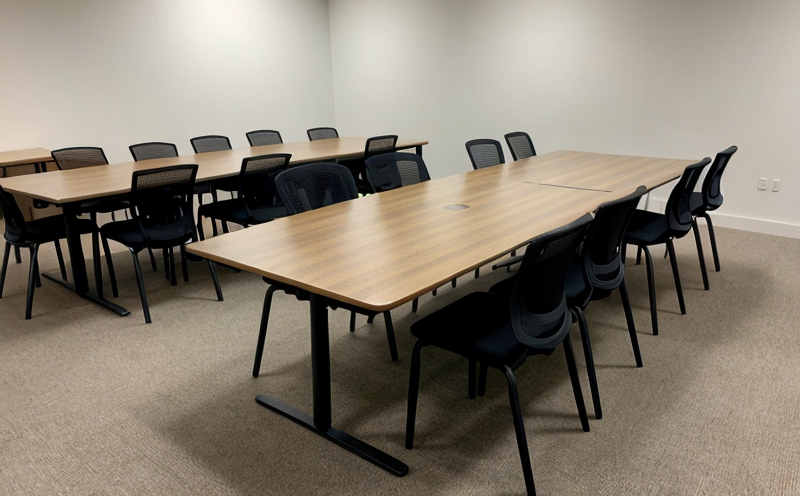ASTM D6007 Determining Formaldehyde Emissions from Desk Panels Testing
The ASTM D6007 standard is a crucial test method used to determine the formaldehyde emissions from desk panels, which are essential components in many furniture items. This service plays a pivotal role in ensuring that products meet stringent environmental and health standards set by industry regulations.
Formaldehyde is a common chemical found in various materials used for manufacturing desks and tables. It can be emitted into the air as a gas, posing potential risks to human health if not properly controlled. The ASTM D6007 test measures these emissions under specific conditions, providing critical data that helps manufacturers and designers ensure their products are safe.
The testing process involves placing a sample of desk panel material in a climate-controlled chamber where the temperature and relative humidity can be precisely regulated to simulate real-world environmental conditions. Over time, formaldehyde is released from the sample into a gas stream which is then measured using infrared detection techniques. The results provide an accurate quantification of the emissions.
This test not only ensures compliance with international standards but also enhances product quality and safety. Compliance with such standards is becoming increasingly important as awareness about indoor air quality and its impact on health grows. Manufacturers who adhere to these tests can build trust with consumers, especially those in sensitive environments like schools, hospitals, and offices.
The ASTM D6007 test is particularly relevant for desks used in office settings where prolonged exposure might occur. The ability to measure formaldehyde emissions accurately allows manufacturers to make informed decisions about material selection and process improvements, ultimately leading to safer products.
- Benefits: Ensures compliance with international standards; enhances product safety; builds consumer trust; supports continuous improvement in manufacturing processes.
- Quality and Reliability Assurance: Rigorous testing procedures; precise measurement techniques; accurate reporting methods.
The ASTM D6007 test is part of a broader suite of services offered by our laboratory, designed to meet the needs of various stakeholders in the furniture industry. By providing this service, we contribute significantly to maintaining high standards of quality and reliability across all aspects of product development.
Quality and Reliability Assurance
The reliability of our ASTM D6007 testing service is paramount to maintaining the highest quality standards in furniture manufacturing. Our laboratory adheres strictly to international standards such as ISO 17025, ensuring that all tests are conducted under controlled conditions with state-of-the-art equipment.
Our team of experts uses advanced instrumentation and methodologies to ensure accurate and precise results. We employ rigorous quality control measures at every stage of the testing process, from sample preparation to final analysis. This commitment to excellence guarantees consistent outcomes that can be trusted by all stakeholders in the furniture industry.
- Benefits: Accurate measurement; consistent outcomes; enhanced trust and credibility.
- Quality and Reliability Assurance: ISO 17025 compliance; advanced instrumentation; rigorous quality control measures.
Our dedication to quality ensures that every test conducted meets the highest industry standards, providing reliable data that can be used for continuous improvement in product design and manufacturing processes.
International Acceptance and Recognition
The ASTM D6007 standard is widely recognized across various countries and regions. Its international acceptance underscores its importance in ensuring the safety and quality of furniture products globally.
This test method has been adopted by numerous regulatory bodies worldwide, including those in Europe (EN 13986), China (GB/T 24410-2009), and other standards organizations. By adhering to ASTM D6007, manufacturers can demonstrate compliance with international regulations and gain competitive advantages in the global market.
The widespread recognition of this test also enhances consumer confidence, as it provides assurance that products meet rigorous environmental and health safety standards. This is particularly important for furniture used in sensitive environments such as schools, hospitals, and offices where prolonged exposure to formaldehyde could pose risks to occupants' health.





